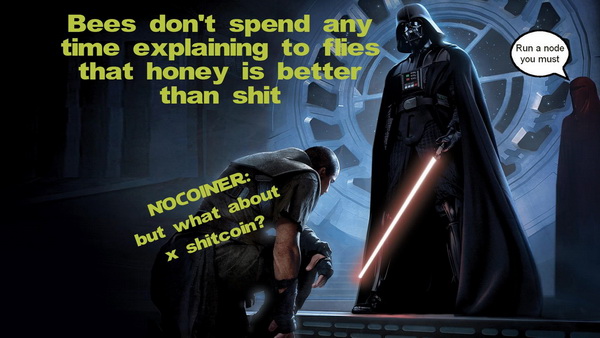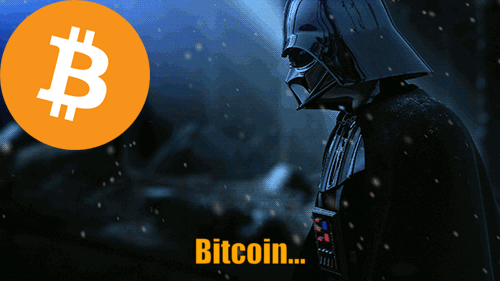Myths and FUD questions from nocoiners

 |
|
 |
|
 |
|
 |
|
 |
|
 |
|
 |
|
 |
|
Originally posted on Substack on Jan 07, 2023
This article was posted and registered OP_RETURN at block height #770714
Updated here on Dec 15, 2024
This article is a collection of myths and questions about Bitcoin from many people that they were asking me these things during all these years. In order to not waste more time debating these questions, I will put them together here so all nocoiners, pre-coiners and all those that still have these questions in their mind, to read them and understand once and for all: BITCOIN IS HERE TO FREE THE WORLD.
Read this important initial article: 21 Reasons Why Bitcoin Will Save The World
THE 30 BITCOIN MYTHS
#1 - Bitcoin is like all other digital currencies, nothing new
Almost all other digital currencies are centrally controlled. This means that:
- They can be printed according to the subjective whims of the drivers.
- They can be destroyed by attacking the central control point.
- Controllers can impose arbitrary rules on their users
Being decentralized, Bitcoin solves all these problems.
Read more - Bitcoin commandments.
#2 - Bitcoin does not solve any problems that fiat currency and / or gold do not solve
- Unlike gold, bitcoins are: Easy to transfer, Easy to secure, Easy to verify, Easy to granulate.
- Unlike fiat currencies, bitcoins are: Predictable and limited in supply, Not controlled by a central authority (such as the United States Federal Reserve), Not based on debt.
- Unlike electronic fiat currency systems, bitcoins are: Potentially anonymous, Freeze proof, Faster to transfer, Cheaper to transfer.

#3 - Miners, developers or some other entity could change the properties of Bitcoin to benefit themselves.
Bitcoin's properties cannot be illegitimately traded as long as the majority of the Bitcoin economy uses full node wallets. Transactions are irreversible and uncensorable as long as no coalition of miners has more than 50% hashing power and the transactions have an appropriate number of confirmations.
Bitcoin requires certain properties to be applied to make it a good form of money, for example:
- No one created money out of thin air (except miners, and only according to a well-defined schedule).
- Nobody spent coins without knowing their private key.
- No one spent the same coin twice
- No one violated any of the other complicated rules that are needed for the system to work (difficulty, proof of work, DoS protection, ...).
These rules define bitcoin. A full node is software that checks bitcoin rules. Any transaction that breaks these rules is not a valid bitcoin transaction and would be rejected in the same way that a careful goldsmith rejects fool's gold.
Full node wallets should be used by any intermediate or higher bitcoin user, and especially bitcoin companies. Therefore, anyone who tries to create bitcoins with invalid properties will be rejected by any trading partner. Note that lightweight wallets and web wallets do not have the low-trust benefits of full node wallets. Light wallet (SPV) will blindly trust miners, which means that if 51% of miners printed infinite coins or spent the same coin twice, light wallet users would happily accept these fake bitcoins as payment. Web wallets blindly trust the web server, which could display anything.
Miners must choose from several valid transaction histories. A coalition of more than 50% of the mining power can (at great cost to themselves) rewrite transaction history, so mining decentralization is necessary to keep transactions irreversible. Miners burn a lot of electrical energy in the mining process, so they must constantly exchange their bitcoin income to pay the bills. This makes miners completely dependent on the overall bitcoin economy and therefore gives them a strong incentive to mine valid bitcoin blocks that full nodes will accept as payment.
Influential figures in the community (such as developers, politicians, or investors) may attempt to use their influence to convince people to download and run modified full node software that illegitimately changes the properties of bitcoin. This is unlikely to be successful as long as counterarguments can be freely disseminated through the media, Internet forums, and chat rooms. Many bitcoin users don't follow bitcoin forums on a regular basis or don't even speak English. All appeals to run alternative software must be critically considered to see if the individual agrees with the proposed changes. Full node software should always be open source so that any programmer can examine the changes for himself. Due to the coordination problem, there is usually a strong incentive to maintain the status quo.
#4 - Bitcoin is backed by processing power.
It is not correct to say that Bitcoin is "backed by" processing power. A "backed" currency means that it is pegged to something else through a central entity at a certain exchange rate, but bitcoins cannot be exchanged for the computing power that was used to create them. Bitcoin, in this sense, is not backed by anything. It is a currency in its own right. Just as gold is not backed by anything, the same applies to Bitcoin.
Bitcoin currency is created through processing power, and the integrity of the blockchain is protected by the existence of a network of powerful computing nodes against certain attacks.
#5 - Bitcoins are worth nothing because they are not backed by anything
It could be argued that gold is also not backed by anything. Bitcoins have properties resulting from the design of the system that allow them to be subjectively valued by individuals. This valuation is demonstrated when people freely exchange for or with bitcoins. Check out the subjective theory of value. Also here is a very good article, written by Jeffrey Tucker about what gives value to Bitcoin.
Read more - What Gave Bitcoin Its Value?
#6 - The value of bitcoins is based on the amount of electricity and computing power it takes to mine them.
This statement is an attempt to apply the labor theory of value, which is generally accepted as false, to Bitcoin. Just because something requires X resources to create does not mean that the resulting product will be worth X. It may be worth more, or less, depending on how useful it is to your users.
In fact, causality is the opposite (this applies to the labor theory of value in general). The cost of mining bitcoins is based on their value. If bitcoins increase in value, more people will mine (because mining is profitable), therefore the difficulty will increase and the cost of mining will increase. The opposite happens if bitcoins go down in value. These effects are balanced to make mining always cost an amount proportional to the value of bitcoins it produces.
Here is an explanatory audio (EN) on the energy consumption to mine Bitcoin, by Andreas Antonopulous.
#7 - Bitcoin has no intrinsic value (unlike other things)
This is simply not true. Each bitcoin gives the holder the ability to embed a large number of short messages during the transaction in a time-stamped, globally distributed permanent data store, namely the bitcoin blockchain. There is no other similar data warehouse that is so widely distributed. There is a trade-off between the exact number of messages and how quickly they can be embedded. But from December 2013, it is fair to say that a bitcoin allows you to embed about 1,000 such messages, each within 10 minutes after shipment, since a rate of 0.001 BTC is sufficient to confirm transactions quickly . This message embedding certainly has intrinsic value because it can be used to prove ownership of a document at a given time, to the include a one-way hash of the document in a transaction. Considering that electronic notarization services charge something like $ 10 per document, this would give an intrinsic value of around $ 10,000 per bitcoin.
While some other tangible commodities have intrinsic value, that value is generally much less than their bargain price. Consider, for example, that gold, if not used as a store of value inflation-proof, but only for industrial uses, it certainly would not be what it is today, since the industrial requirements of gold are much smaller than available. supply of the same.
In any case, although historically intrinsic value and other attributes such as divisibility, fungibility, scarcity, durability, helped establish certain commodities as a means of exchange, it is certainly not a prerequisite. While bitcoins are accused of lacking "intrinsic value"; in this regard, they more than make up for it by possessing the other qualities necessary to make it a good medium of exchange, equal to or better than merchant money.
Another way to think about this is to consider the value of bitcoin on the global network, rather than each bitcoin in isolation. The value of an individual phone is derived from the network to which it is connected. If there were no telephone network, a telephone would be useless. Similarly, the value of an individual bitcoin is derived from the global network of merchants, exchanges, wallets, etc. ... A bitcoins enabled the same as a phone is needed to transmit voice information through the network, a bitcoin is necessary to transmit financial information through the network.
Value is ultimately determined by what people are willing to negotiate: supply and demand.
#8 - Bitcoin is illegal because it is not legal tender.
In March 2013, the US Financial Crimes Enforcement Network issued a new set of guidelines on "decentralized virtual currency"; clearly targeting Bitcoin. Under the new guidelines, "a virtual currency user is not a money services company (MSB) under FinCEN regulations and is therefore not subject to MSB registration, reporting and record keeping regulations". Miners, when mining bitcoins for their personal use, are not required to register as an MSB or Money Transmitter.
Generally, there are several currencies that are not official government-backed currencies. After all, a currency is nothing more than a convenient unit of account. While national laws may vary from country to country, and you should certainly check the laws in your jurisdiction, generally trading any product, including digital currency such as Bitcoin, BerkShares, gaming currencies such as WoW gold or the Linden dollars, it's not illegal.
What is the definition of “legal tender”?
You cannot force a retailer to accept legal tender or indeed any other form of tender. If, however, you buy something from them and there is no contractual barrier to use of any form of tender, and you offer legal tender in payment, and they refuse it, then they cannot enforce the debt in court.
That’s what legal tender means: it’s about discharging debts. If you incur a debt you can discharge it with legal tender, but you cannot be forced to incur the debt in the first place.

#9 - Bitcoin is a form of national terrorism because it only damages the economic stability of the US and its currency.
Under the definition of terrorism in the United States, it is necessary to engage in violent activity to be considered a terrorist for legal purposes. Recent impromptu comments from politicians have no legal or factual basis.
Also, Bitcoin is not a national of the US or any other country. It is a global community, as can be seen from this Bitcoin nodes map.
#10 - Bitcoin will only allow tax evaders, which will lead to the eventual downfall of civilization.
Cash transactions offer a higher level of anonymity, but are still successfully taxed. Up to you to follow the applicable tax laws in their country of origin or face the consequences.
While it may be easy to transfer bitcoins so pseudonymous spend on tangible assets is as difficult as any other type of spending money anonymously. Tax evaders are often trapped because their lifestyle and their assets do not match their declared income, not necessarily because the government can track your money.
Finally, the Bitcoin blockchain is a permanent record of all transactions, which means that you can extract information at any time in the future, which makes research, tracking of funds, etc., much more easier than with other forms of payment.
But the important question is: Taxation is theft anyways, in any form or shape. If a central bank can print / generate endless supply of money, why do we still pay taxes?
Bitcoin is THE SEPARATION OF MONEY AND STATE.
#11 - Bitcoins can be printed / minted by anyone and therefore have no value.
Bitcoins are not printed / minted. Instead, the blocks are calculated by the miners and their efforts are given a specific amount of bitcoins and transaction fees paid by others. See Mining for more information on how this process works.
#12 - Bitcoins are worthless because they are based on unproven cryptography.
SHA-256 and ECDSA that are used in Bitcoin are well known industry standard algorithms. SHA-256 is endorsed and used by the US government and is standardized (FIPS180-3 Secure Hash Standard). If you believe that these algorithms are unreliable, you should not trust Bitcoin, credit card transactions, or any type of electronic bank transfer. Bitcoin has a solid foundation in well-understood cryptography.
#13 - Early adopters are unfairly rewarded
The first users are rewarded for taking on more risk with their time and money. The capital invested in bitcoin at every stage of its life strengthened the community and helped the currency reach subsequent milestones. Argue that early adopters do not deserve to benefit from this is akin to saying that the first investors in a business, or people who buy shares in the IPO (Initial Public Offering) of a company, are rewarded unfairly.
This argument also depends on early adopters using bitcoins to store rather than transfer value. Daily trading on exchanges (as of January 2012) indicates that smaller transactions are becoming the norm, indicating trading rather than investment. In more pragmatic terms, "equity" is an arbitrary concept that is unlikely to be accepted by a large population. Establishing "equity" is not a goal of Bitcoin, as this would be impossible.
Looking to the future, considering the amount of publicity given bitcoin until April 2013, there can be no reasonable grounds for complaints of people who did not invest at that time and then see the value (possibly) increases dramatically.
At the start extracting or acquire bitcoins today, you can also become one of the early adopters.
#14 - 21 million coins is not enough, does not scale
A Bitcoin is divisible up to eight decimal places. There are actually 2,099,999,997,690,000 (just over 2 quadrillion) of maximum possible atomic units in the bitcoin system.
The value of "1 BTC" represents 100,000,000 of these. In other words, each bitcoin is divisible by up to 108.
As the value of the unit of 1 BTC grew too large to be useful for everyday transactions, people began to negotiate with smaller units such as milli-bitcoins (MBTC) or micro-bitcoins (μBTC).
#15 - Bitcoins are stored in wallet files, just copy the wallet file to get more coins!
No, your wallet contains your secret keys, which gives you the rights to spend your bitcoins. Think of it like having bank details stored in a file. If you give your bank details (or bitcoin wallet) to someone else, that does not double the amount of money in your account. You can spend your money or they can spend your money, but not both.
#16 - Lost coins cannot be replaced and this is bad
Bitcoins can be divided into 0.00000001, so having fewer bitcoins left is not a problem for the currency itself. If you lose your coins, indirectly all other coins are worth more due to the reduced supply. Consider it a donation to all other bitcoin users.
A related question is: Why don't we have a mechanism to replace lost coins? The answer is that it is impossible to distinguish between a 'lost' coin and one that is simply unused in someone's wallet. And for quantities that are shown to be destroyed or lost, there is no census that this is a bad thing and needs to be recirculated.
#17 - It’s a giant ponzi scheme
In a Ponzi scheme, the founders persuade investors that they will get profits. Bitcoin does not offer such a guarantee. There is no central entity, only individuals who build an economy.
A Ponzi scheme is a zero sum game. In a Ponzi scheme, the former users can only profit at the expense of the latter, and the latter always lose. Bitcoin can have a beneficial outcome for everyone. Early adopters benefit from the increase in value as Bitcoin becomes better understood and in turn demanded by the general public. All adopters benefit from the usefulness of a trusted and widely accepted decentralized peer-to-peer currency.
It is also important to note that Satoshi Nakamoto, creator of bitcoin, has never wasted a bitcoin (other than give it away as worthless), which can be verified by checking the block chain. Another thing: you never been asked, which is the Social Security? There is a Ponzi scheme? Yet still you are paying it ...
#18 - Finite coins plus lost coins means deflationary spiral
As deflationary forces can be applied, such as hoarding economic factors are offset by human factors that can reduce the chances that a deflationary spiral occurs.
#19 - Bitcoin cannot work because there is no way to control inflation.
Inflation is simply an increase in prices over time, which is generally the result of the devaluation of a currency. This is a function of supply and demand. Since the supply of bitcoins is fixed at a certain amount, unlike fiat money, the only way for inflation to get out of control is for the demand to disappear. Temporary inflation is possible with rapid adoption of fractional reserve banking, but it will stabilize once banks store a substantial amount of the 21 million "hard" bitcoins as reserves.
Given the fact that Bitcoin is a distributed system of currency, if demand were to drop to next to nothing, the currency would be doomed anyway.
The key point here is that Bitcoin as a currency cannot be inflated by a single person or entity, such as a government, as there is no way to increase the supply beyond a certain amount.
In fact, the most likely scenario, as Bitcoin becomes more popular and demand increases, is that the currency increases in value, or deflates, until demand stabilizes.
#20 - Anyone with enough computing power can take over the network
This is true: see Weaknesses - The attacker has a lot of computing power.
That said, as the network grows, it becomes increasingly difficult for a single entity to do so. The computing power of the Bitcoin network is already well ahead of the world's fastest supercomputers, put together.
What an attacker can do once they have taken over the network is quite limited. Under no circumstances could an attacker create fake coins, fake transactions, or take someone else's money. The capabilities of an attacker are limited to recovering their own money that they recently spent and preventing other people's transactions from receiving confirmations. Such an attack would be very costly in resources and, for such meager benefits, there are few rational economic incentives to do so.
Furthermore, this attack scenario would only be feasible while it was active. As soon as the attack was stopped, the network would resume normal operation.
Andreas Antonopoulos - 51% Bitcoin Attack
#21 - Bitcoin violates government regulations
There is no known government regulation that prohibits the use of Bitcoin. See also: the myth of "Bitcoin is illegal because it is not legal tender".
Also, who is the government? Who gives "power" to a government? Not you Better said: if you are worried that some government wants to ban Bitcoin, you better ask yourself: what about the government?
Read more: Government is a coroporation

#22 - After 21 million coins are mined, no one will generate new blocks.
When operating costs can not be covered by the reward of building blocks, what will happen some time before the total amount of BTC, miners gain some profits from transaction fees is reached. However, unlike block reward, there is no coupling between transaction fees and the need for security, so there is less guarantee that the amount of mining that is done will be sufficient to maintain network security.
#23 - Bitcoin does not have a built-in chargeback mechanism and this is bad.
Bitcoin base layer transactions are final and irreversible by design, but consumer protection can still be built into Bitcoin at other higher layers. The most practical way to do this is a multi-signature trust. For example, when trading without a prescription, using an escrow is essential protection.
It's worth noting that virtually all successful consumer-facing bitcoin companies already implement some form of consumer protection; The routine trust was used by Localbitcoins, Silk Road, and the bitcoin ebay site Bitmit. Others, such as Bitcoin online casinos rely on its long standing reputation, while others like Coinbase.com rely on the legal and regulatory system.
The bitcoin method of routinely using escrow has benefits over competitors like credit cards. Credit card security is not very good, which translates to higher costs overall and the possibility of payments being reversed months later. In contrast, when the bitcoins have been delivered to the seller from escrow, they cannot be reversed as the coins are actually in the seller's possession. The requirement to use real names for credit cards and PayPal also excludes the unbanked and those from countries with less developed financial infrastructure. There are also downsides, such as that bitcoin is not yet as widely accepted as credit cards and is not a front for providing lines of credit.
#24 - Quantum computers would break the security of Bitcoin
While ECDSA is unsafe under quantum computing, quantum computers don't exist yet and probably won't for a while. The DWAVE system that is often written about in the press is not, even if all its claims are true, a quantum computer of a kind that could be used for cryptography. Bitcoin safety when used properly with a new direction in each transaction depends on more than just ECDSA: Cryptographic hashes are the much stronger than ECDSA under QC.
The security of Bitcoin was designed to be upgraded in a backward-compatible manner and could be upgraded if deemed an imminent threat (cf. Aggarwal et al. 2017, "Quantum Attacks on Bitcoin and How to Protect Against Them").
See the implications of quantum computers for public key cryptography.
The risk of quantum computers also exist for financial institutions such as banks, because they depend heavily on cryptography when transacting.
Here is a masterful answer on attacks on Bitcoin with Quantum Computing by Andreas Antonopulous.
And another answer here by the same A.A.
And here you have described how Quantum proof can be activated on Bitcoin
#25 - Bitcoin mining is a waste of energy and harmful to the ecology
No more than the waste of extracting gold from the ground, melting it into bars, and then putting it back underground. Not to mention the construction of large luxury buildings, the waste of energy printing and minting all the various fiat currencies, the transportation of them in armored cars by no less than two security guards each that could probably be doing something more productive. , etc.
When it comes to the means of exchange, Bitcoin is actually quite economical in resources, compared to others.
Economic argument 1
Bitcoin mining is a highly competitive, dynamic and near perfect market. Mining rigs can be installed and disassembled almost anywhere in the world with relative ease. Therefore, market forces constantly push mining activity to places and times when the marginal price of electricity is low or zero. These electrical products are cheap for a reason. It is often because electricity is difficult (and wasteful) to transport, difficult to store, or because there is low demand and high supply. Using electricity in this way is far less wasteful than simply plugging a mining rig into the power grid indiscriminately.
For example, Iceland produces a glut of cheap electricity from renewable sources, but has no way to export electricity due to its remote location. It is conceivable that at some point in the future Bitcoin mining is profitable only in places like Iceland and unprofitable in places like Central Europe, where electricity comes mainly from nuclear sources and fossils.
Market forces could even drive mining towards innovative solutions that have zero effective electricity consumption. Mining always produces heat equivalent to the energy consumed; for example, 1000 watts of mining equipment produces the same amount of heat as a 1000 watt heating element used in an electric space heater, hot tub, water heater, or similar appliance. Someone who is already willing to incur the cost of only electricity for its heating value could run mining equipment specially designed to extract bitcoins while capturing and using the heat produced without incurring any cost energy beyond what already had the intention to spend on heating.
(Note that this is just an example; mining will not always produce heat equivalent to the energy consumed because inevitably some of the energy is released as electromagnetic radiation, among others.)
Economic argument 2
When considering the environmental costs of mining, they need to be weighed against the benefits. If you question Bitcoin on the basis that it consumes electricity, you should also ask questions like this: Will Bitcoin promote economic growth by freeing up trade? Will this accelerate the pace of technological innovation? Will this lead to faster development of green technologies? Will Bitcoin Enable New Smart Grid Technologies Crossing the Border? ...
The firing of Bitcoin due to its costs, while ignoring its benefits, is a dishonest argument. In fact, any such environmental argument is dishonest, not just related to Bitcoin. Along the same lines, one could argue that wind turbines are harmful to the environment because manufacturing steel structure consumes power.
Economic argument 3
Bitcoin is designed as a deflationary currency. This means that the purchasing power of a bitcoin will generally increase over time, unlike fiat currencies that are designed to lose value over time. This, in turn, will make people more willing to keep their bitcoins, rather than use them for consumption. This reduction in consumption will likely contribute to a net reduction in pollution. However, this is a speculative argument that has not been proven to be correct or incorrect.
Capital cost vs. electrical cost ratio The BFL Jalapeno is hashed at 5.5 Gh / s using 30W. This device consumes about $ 40 per year in electricity (using an average residential EE. UU. From about $ 0.15 per kWh). But the device costs more than $ 300, including shipping. Therefore, almost a quarter of all costs over a two-year lifetime goes to electricity. This compares to GPUs where more than 90% of the costs over a two-year lifetime went to electricity. Even more efficient designs can be expected in the future.
#26 - Merchants cannot seriously price bitcoin due to the volatile exchange rate.
The assumption is that bitcoins must be sold immediately to cover operating expenses. If the merchant's back-end expenses were also made in bitcoins, then the exchange rate would be irrelevant. Greater adoption of Bitcoin would make prices stick. Future volatility is expected to decrease as the size and depth of the market increases.
Meanwhile, many traders simply regularly get the latest market rates from the exchanges and automatically update the prices on their websites. You may also be able to buy a put option to sell at a fixed rate for a specified period of time. This would protect you from drops in price and simplify your operations during that time period.
#27 - Like Flooz and e-gold, bitcoins serve as opportunities for criminals and will be closed.
- Visa, MasterCard, PayPal, and cash also serve as opportunities for criminals, but society maintains them because of their recognized net profit.
- Hopefully, Bitcoin will grow to the point where no organization can disrupt the network, or would better benefit by helping it.
- Terrorists fly airplanes into buildings, but governments have yet to abolish consumer air travel. Obviously, in his opinion, the public good outweighs the possible evil.
- Criminal law differs between jurisdictions.
#28 - Bitcoins will be shut down by the government just like freedom dollars.
Liberty Dollars began as a trading company to establish an alternative US currency, including physical notes and coins, backed by precious metals. This, in itself, is not illegal. They were prosecuted under counterfeiting laws because the silver coins allegedly resembled American currency.
Bitcoins do not resemble the currency of the US or any other nation in any way, shape or form. The word "dollar" is not attributed to them in any way. The "$" symbol is not used in any way.
Bitcoins have no representative similarity to US dollars.
Of course, "closing" the Liberty Dollars was as easy as arresting the director of the company and seizing the offices and the precious metals used as backup. Decentralized Bitcoin, without a leader, without servers, without an office and without the backing of tangible assets, does not have the same vulnerability.
#29 - Bitcoin is a pyramid scheme
Bitcoin is almost the opposite of a pyramid scheme in a mathematical sense. Because bitcoins are algorithmically scarce, no exponential benefit is derived from introducing them to new users. There is a quantitative benefit to having additional interest or demand, but this is by no means exponential. Again: haven't you asked yourself if Social Security is a pyramid scheme? But they keep paying ...
#30 - Bitcoin was hacked / will be hacked
In the history of Bitcoin, there has never been a blockchain attack that results in money being stolen from a confirmed exit. There has also been no reported theft as a direct result of a vulnerability in the original Bitcoin client or a vulnerability in the protocol. Bitcoin is protected by standard cryptographic functions. These features have been reviewed by cryptography experts and are considered unlikely to be broken in the foreseeable future.
It's safe to say that the currency itself has never been 'hacked'. However, several major websites using the currency have been hacked, often resulting in high-profile Bitcoin thefts. Some media outlets erroneously report these heists as hacks of Bitcoin itself. An analogy: just because someone has stolen US dollars from a supermarket does not mean that the US dollar as currency has been "hacked."
Most bitcoin thefts are the result of inadequate wallet security. In response to the wave of thefts in 2011 and 2012, the community has developed risk mitigation measures, such as wallet encryption, multi-signature support, offline wallets, paper wallets, and hardware wallets. As these measures gain adoption by merchants and users, the number of thefts decreases.
And to close, I leave here a song (the second) about the "obituary" of Bitcoin, he has died so many times that the bastard still does not want to die ...
Do you want to read about more FUD Bitcoin myths? Here is a great resource page with many articles debunking all sorts of FUD about Bitcoin: